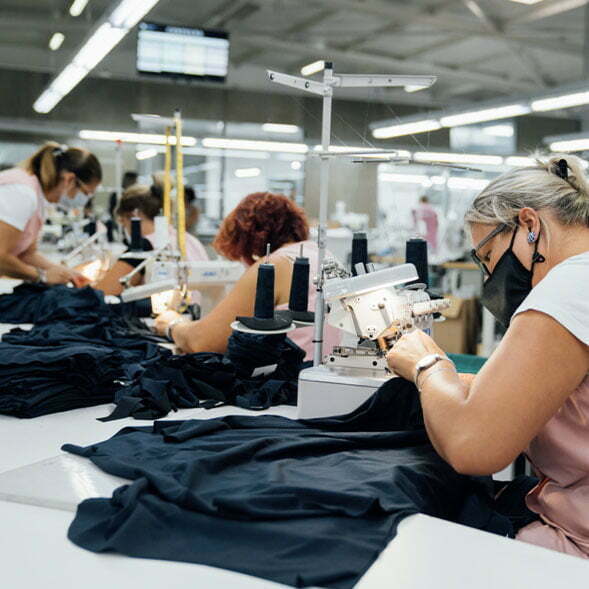
Sustainability is the buzzword in the global fashion industry. Consumers, regulators and even retailers are demanding more transparency on how clothes are made and sold. No longer is it enough to design great looking clothes, brands need to prove their products are made responsibly, ethically and with minimal environmental impact. In this new landscape high quality garment production is the key to sustainable fashion.
Conscious Consumerism
Over the last 10 years there has been a big shift in consumer behaviour. Consumers are becoming more aware of the consequences of fast fashion, from excess waste to unsafe working conditions. Instead of chasing low cost, disposable clothes many are now looking for durable, ethically made and environmentally responsible garments. This has put new pressure on manufacturers and brands. To meet these expectations fashion businesses are turning to High Quality Garment Manufacturing to make products that last longer, reduce waste and align with consumer values.
Quality and Longevity
Sustainable fashion is all about longevity. The longer a garment lasts the less often it needs to be replaced and therefore less waste and consumption. By focusing on top stitching, high quality fabrics and precise finishing manufacturers can extend the life of a garment by years. That’s why working with a Garment Manufacturing Company that puts quality first is so important – brands that do create products that customers love and wear for years and support a sustainable cycle.
Reducing Waste in Production
One of the biggest problems in the fashion industry is textile waste. Millions of tons of fabric scraps and unsold inventory end up in landfills every year, that’s a big environmental problem. High Quality Garment Manufacturing tackles this by implementing production methods that use less fabric, reduce defects and errors during cutting and stitching. By producing with care and precision manufacturers save resources and reduce the chance of returns and replacements which often add to waste.
Technology and Sustainability
Innovation plays a big role in bridging the gap between quality and sustainability. A forward thinking Garment Manufacturing Company uses technology like automated cutting, 3D sampling and digital pattern making to achieve greater accuracy and efficiency. These innovations reduce excess material, energy consumption and streamline supply chains. For brands committed to sustainable fashion working with manufacturers that invest in this technology means their collections meet modern standards without compromising on environmental responsibility.
Ethical Labour and Fair Production
Sustainability is not just about materials and production – it’s also about people. Ethical labour practices are the foundation of sustainable fashion. Consumers are getting louder about ensuring workers in the garment industry are treated fairly, paid well and have safe working conditions. This is another area where High Quality Garment Manufacturing excels. Companies that adhere to strict labour standards prove that sustainability is not a trend – it’s a commitment to fairness and responsibility. Brands that work with such companies increase their credibility and contribute to long term industry improvements.
Sustainable Fabrics and Eco-Friendly Materials
The choice of fabric has a direct impact on sustainability. Organic cotton, recycled polyester, bamboo, hemp and other eco-friendly materials are being adopted by responsible manufacturers. A good Garment Manufacturing Company can source, test and integrate these fabrics into collections while maintaining high quality standards. The result is garments that are not only eco-friendly but also durable, fashionable and competitive in the market.
Consumer Trust and Brand Reputation
Trust is currency. Customers will buy from brands that show they really care about sustainability. High quality production means they know garments are not just looking good on the shelf but are designed to last and have values. By delivering durable products brands can stand out in a crowded market, attract eco conscious customers and charge premium prices. That’s what builds strong long term reputations.
The Competitive Advantage of Sustainability
Sustainable fashion is not a trend, it’s the future of the industry. Global regulations are getting tougher and businesses that don’t adapt will fall behind. Those that integrate sustainability into their supply chain will gain an advantage. High Quality Garment Manufacturing means brands are not only compliant with the changing regulations but also ahead of the curve in the shift to responsible fashion. By producing garments that meet both ethical and aesthetic expectations manufacturers help brands grow for the long term.
Sustainable Fashion Challenges
While the benefits are clear, sustainable fashion isn’t without its challenges. From sourcing sustainable fabrics to managing costs and production processes, it requires commitment and teamwork. Brands face the challenge of being profitable and responsible. That’s why choosing the right partner is key. Working with an experienced Garment Manufacturing Company helps brands navigate these complexities by offering scalable solutions, access to eco friendly materials and expertise.
Conclusion
Sustainable fashion is no longer a choice, it’s a must. As we move forward quality and sustainability will be one and the same. By investing in high quality garment production fashion brands reduce waste and create products customers will love for the long term. Ethical practices, eco friendly fabrics and technology will all come together to make fashion beautiful and responsible.
For businesses looking for a trusted partner in this journey AM & RC INC has become a go to name in the garment manufacturing industry. They have built strong relationships with global fashion brands by focusing on quality, innovation and sustainability. They work closely with brands to deliver collections that are durable, ethically produced and on trend. Their commitment to responsible practices means every garment is crafted with care and will help brands succeed in the competitive world of sustainable fashion.